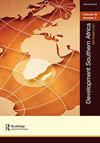在发展中国家范围内制订支出审查方法
IF 1.3
4区 经济学
Q3 DEVELOPMENT STUDIES
引用次数: 1
摘要
摘要本文讨论了南非政府发展起来的支出审查方法。典型的支出审查将深入的制度和政策评估与广泛的支出分析和成本建模结合起来。本文讨论了在发展中国家的背景下,支出审查方法如何适应当地条件,例如围绕政治和机构自治与合作的限制、政府官员的技能水平、数据可用性和围绕改革议程的沟通。文章概述了在应对这些挑战时,南非支出审查方法如何制定了六步模块化方法,使方法标准化,并为公务员、顾问和政治领导提供了明确的指导。这使得一个复杂的分析过程得以在公共部门广泛采用,对发达国家和发展中国家都具有方法论价值。关键词:支出审查公共财政管理改革发展中国家南非预算改革披露声明作者未报告潜在利益冲突。注1事实上,在227项支出审查中,只有一个案例的部门反对调查结果。制定计划,不要抱怨2000年,财政部和国家支出部合并为国家财政部。4在南非财政部,政府间关系、公共财政和预算办公室的部门组成预算组;预算小组相当于大多数其他财政部门的预算办公室。5有一个部门提出了反对,但他们无法提供任何真实的数据来支持他们的立场,而且这种反对被视为纯粹的意识形态,与分析没有任何联系局长是政府部门的最高职位,他们是一个部门的会计主管。这相当于英国体制中的常任秘书南非宪法法院听证日期:2021年8月24日判决日期:2022年2月28日全国教育、卫生和联合工人工会及其他人诉公共服务和行政部长及其他人。南非民主教师工会和其他组织v公共服务和行政部门和其他组织。公务员协会等诉行政长官等。全国公务员工会诉公务员行政长官等。有条件现金转移支付21/21;有条件现金转移支付28/21;有条件现金转移支付29/21;这不包括直接向财政部资产负债管理(ALM)部门报告的大型国有企业。本文章由计算机程序翻译,如有差异,请以英文原文为准。
The development of a spending review methodology in a developing country context
ABSTRACTThis article discusses the spending review methodology developed in the South African government. A typical spending review combines a deep institutional and policy evaluation with extensive expenditure analysis and cost modelling. The article discusses how, in the context of a developing country, the spending review methodology had to adapt to local conditions, such as constraints around political and institutional autonomy and cooperation, the skills level of government officials, data availability and communication around a reform agenda. The article outlines how, in responding to these challenges, the South African spending review methodology developed a six step modularised approach that standardised the methodology and provided clear guidance to civil servants, consultants and political leadership. This has allowed a sophisticated analytical process to be widely adopted in the public sector and could be of methodological value to developed and developing countries alike.KEYWORDS: Spending reviewpublic finance management reformsdeveloping countrySouth Africabudget reform Disclosure statementNo potential conflict of interest was reported by the author(s).Notes1 And indeed, in only one case out of 227 spending reviews did the line ministry object to the findings.2 ‘make a plan – do not complain’.3 In 2000, the Departments of Finance and State Expenditure amalgamated to form National Treasury.4 In the South African Treasury, the divisions of Inter-Governmental Relations, Public Finance and Budget Office forms the Budget group; the Budget Group is equivalent to a Budget Office in most other Departments of Finance.5 There was one department that objected, but they could not provide any real data to support their position and the objection was seen as purely ideological and not linked to the analysis in any way.6 Director-General is the most senior post in a government department and they function as the accounting officer of a department. This is the equivalent of a permanent secretary in the UK system.7 CONSTITUTIONAL COURT OF SOUTH AFRICADate of hearing: 24 August 2021 Date of judgment: 28 February 2022 National Education Health and Allied Workers Union and Others v Minister of Public Service and Administration and Others.South African Democratic Teachers Union and Others v Department of Public Service and Administration and Others.Public Servants Association and Others v Minister of Public Service and Administration and Others.National Union of Public Service and Allied Workers v Minister of Public Service and Administration and Others.CCT 21/21; CCT 28/21; CCT 29/21; and 44/218 This excludes the large state-owned enterprises who report directly to the Assets and Liabilities Management (ALM) branch of National Treasury.9 In 2022.
求助全文
通过发布文献求助,成功后即可免费获取论文全文。
去求助
来源期刊

Development Southern Africa
DEVELOPMENT STUDIES-
CiteScore
4.20
自引率
7.10%
发文量
42
期刊介绍:
The Development Southern Africa editorial team are pleased to announce that the journal has been accepted into the Thomson Reuters (formerly ISI) Social Science Citation Index. The journal will receive its first Impact Factor in 2010. Development Southern Africa offers a platform for expressing views and encouraging debate among development specialists, policy decision makers, scholars and students in the wider professional fraternity and especially in southern Africa. The journal publishes articles that reflect innovative thinking on key development challenges and policy issues facing South Africa and other countries in the southern African region.
 求助内容:
求助内容: 应助结果提醒方式:
应助结果提醒方式:


